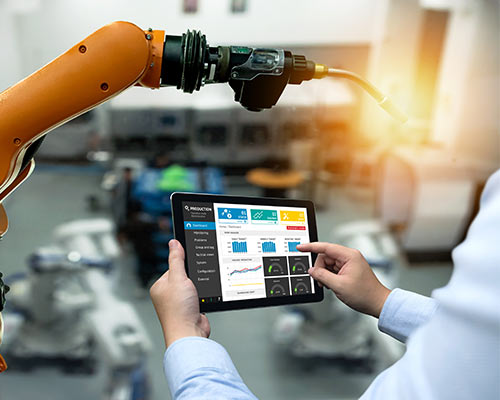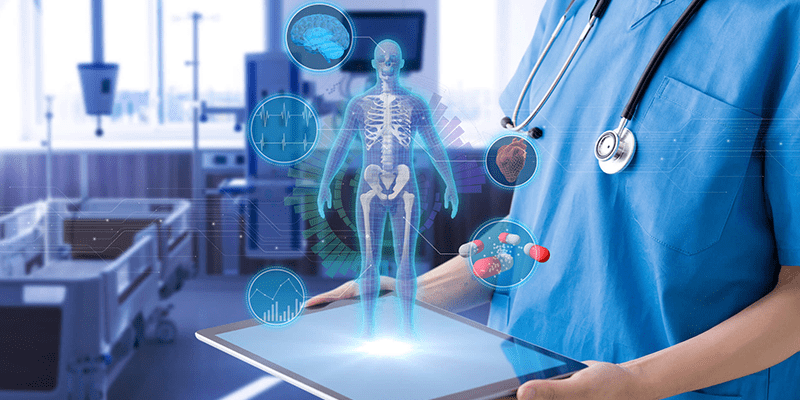The remarkable journey from compliance to excellence in EHR Management powered by AI in healthcare. Uncover how Health Information Management is being transformed and how AI advancements are reshaping the healthcare industry. Dive into a future where healthcare thrives on innovation and patient-centric care.
Within the ever-evolving landscape of the healthcare industry, innovation takes center stage as a guiding light, illuminating the path toward excellence. This journey encompasses the intricate management of Electronic Health Records (EHR) system and the groundbreaking advancements within the AI-driven healthcare sector, marking a remarkable metamorphosis within the field. At the heart of this transformation lies the infusion of artificial intelligence in healthcare, which serves as the linchpin of progress.
Electronic Health Records (EHR), which were once seen as a means of achieving regulatory compliance and efficient data management, have now evolved into a multifaceted system, deeply intertwined with patient care, clinical research, and healthcare decision-making. This transformation from a compliance-driven tool to a catalyst for excellence in healthcare delivery is a testament to the industry's adaptability.
The Role of AI in Healthcare: A Deep Dive
Artificial Intelligence (AI) in the realm of healthcare transcends mere trendy nomenclature; it stands as a monumental catalyst for transformation. This transformative power extends across several crucial facets of the healthcare ecosystem, from the revolutionizing of health records management to the optimization of patient care, and even the ignition of innovative breakthroughs within the industry. The future of healthcare is unfolding before our very eyes, intricately woven with the fabric of AI, heralding an era of unprecedented possibilities.
AI fundamentally transforms the landscape, pushing the boundaries in healthcare innovation of what is possible, and creating an environment where healthcare decisions are driven by data-backed insights. This profound shift could redefine the practice of medicine and the essence of healthcare itself. The convergence of generative AI and healthcare is a realm of limitless potential and boundless exploration, where knowledge and technology converge to reshape the future of human well-being.
Health Information Management: The Crucial Pillar of Healthcare
Health Information Management, an indispensable function that silently but significantly underpins the entire healthcare system. This function is charged with the vital task of ensuring the secure, efficient, and accurate management of patient data – a role that goes far beyond mere record-keeping. Health Information Management professionals serve as the custodians of patient data, entrusted with the responsibility of safeguarding its integrity, ensuring its accessibility, and guaranteeing its security.
The contemporary healthcare landscape is undergoing a metamorphosis, and artificial intelligence is at the forefront of this transformation. AI, with its computational prowess and data-driven acumen, is revolutionizing this domain by automating data entry processes, meticulously flagging anomalies, and bolstering the fortifications around data security. Healthcare AI advancements are transforming the digital archives of a patient's healthcare journey into intelligent systems capable of extracting meaningful insights from the vast amount of data they contain. This not only aids in better patient care but also contributes to medical research.
How Compliance to Excellence is Happening
Transforming the once burdensome compliance requirements into a gateway to operational excellence includes several key facets:- Automated Data Entry and Accuracy: EHR systems traditionally demanded extensive manual data entry, increasing the risk of errors and compromising data integrity. AI-driven technologies, including natural language processing (NLP) and machine learning, have emerged as a solution. They automate data entry by extracting structured information from unstructured clinical notes and dictations. This not only saves time but also enhances data accuracy.
- Real-time Decision Support: AI systems can analyze patient data in real-time, providing healthcare professionals with decision support tools. These tools assist in clinical decision-making, alerting practitioners to potential issues and offering evidence-based recommendations. By aligning care with the latest research and guidelines, AI ensures compliance with best practices, improving patient outcomes.
- Predictive Analytics for Risk Mitigation: AI leverages historical data to predict patient risks. Through predictive analytics, it can identify patients at risk of readmission, complications, or deterioration. This proactive approach ensures that healthcare providers comply with preventive care protocols, minimizing adverse events and the associated costs.
- Interoperability and Data Exchange: Interoperability is a cornerstone of modern healthcare compliance, and AI plays a pivotal role in facilitating seamless data exchange between disparate EHR systems. AI can standardize data formats, making it easier for healthcare institutions to share information securely. As a result, compliance with data sharing regulations becomes more achievable.
- Enhanced Security and Privacy: AI-driven cybersecurity solutions bolster EHR management by constantly monitoring for suspicious activities and breaches. AI can swiftly detect unauthorized access or data anomalies, enabling healthcare organizations to stay compliant with strict data protection regulations such as HIPAA.
- Efficient Documentation and Coding: EHR management is closely tied to accurate coding and billing. AI-powered coding assistance ensures that documentation matches the services provided, reducing the risk of audits and revenue loss. This fosters compliance with billing and coding regulations while optimizing financial performance.
- Improved Workflow and Productivity: Through automating routine tasks, AI streamlines healthcare workflows. This not only enhances staff productivity but also ensures that all necessary documentation and follow-up steps are consistently performed. As a result, EHRs become more compliant with regulatory requirements.
- Continuous Learning and Adaptation: AI systems can learn from data and adapt to changing regulations and best practices. This means that EHRs can stay updated with evolving compliance standards without requiring extensive manual reconfiguration.
- Reduced Administrative Burden: AI's automation of administrative tasks, such as appointment scheduling and prescription refills, allows healthcare professionals to focus more on patient care. This shift towards higher-value tasks ensures that compliance with patient engagement and satisfaction metrics is more readily achieved.
- Enhanced Audit and Reporting Capabilities: AI enables advanced auditing and reporting capabilities. Healthcare institutions can easily generate detailed compliance reports, facilitating internal monitoring and external audits. This transparency builds trust and compliance with regulatory bodies.
Exploring Real-World Examples: Illuminating Concepts and Principles
- IBM Watson for Oncology: IBM's Watson for Oncology is a prime example of how AI can revolutionize cancer treatment and EHR management. By analyzing a patient's medical records, treatment guidelines, and vast volumes of medical literature, Watson provides oncologists with evidence-based treatment options. This ensures compliance with the latest clinical guidelines and best practices, leading to more effective cancer care.
- Nuance Dragon Medical: Nuance's Dragon Medical is a voice recognition software that uses AI to convert spoken words into text in EHRs. This technology significantly reduces the time healthcare professionals spend on manual data entry. For example, at the Massachusetts General Hospital, Dragon Medical has helped clinicians save up to two hours per day on documentation, ensuring timely and accurate record-keeping.
- Google Health DeepMind: Google Health DeepMind has developed an AI-driven clinical alerts system to assist in the early detection of acute kidney injury. By analyzing EHR data, it sends alerts to healthcare providers when it identifies potential cases of kidney injury. This proactive approach ensures compliance with patient safety protocols and leads to better patient outcomes.
- Interoperability through Health Information Exchanges (HIEs): HIEs leverage AI to facilitate seamless data exchange between different EHR systems. For instance, CommonWell Health Alliance and Care quality use AI-driven data normalization to ensure that healthcare providers can access comprehensive and up-to-date patient information, thus complying with interoperability standards.
- Cerner Health Intent: Cerner's Health Intent is an EHR platform that utilizes AI for predictive analytics. It can identify patients at risk of various health issues, such as sepsis or readmission, by analyzing historical patient data. This assists healthcare providers in delivering timely interventions, thereby enhancing compliance with quality and safety standards.
- Suki.AI: Suki.AI is an AI-powered virtual assistant designed for physicians to help with clinical documentation. It listens to conversations between doctors and patients, interprets them, and generates structured notes in EHR systems. By automating the documentation process, Suki.AI ensures compliance with detailed and accurate medical records, reducing the risk of coding and billing errors.
- Nuance CLIN Tegrity 360: CLIN Tegrity 360 is an AI-driven platform that assists healthcare organizations in compliance with coding and documentation accuracy. It uses NLP to review clinical documentation and coding, flagging potential discrepancies or non-compliance with coding standards. This not only helps with accurate billing but also ensures adherence to coding regulations.
Conclusion
EHR systems, once perceived as mere tools for regulatory compliance and data management, have transcended their initial purpose to become integral components of healthcare delivery. They are now deeply interwoven with patient care, clinical research, and healthcare decision-making. The transformative journey of EHRs underscores the adaptability and potential for growth within the healthcare sector.
AI-driven healthcare is revolutionizing the way we diagnose, treat, and prevent diseases. It empowers medical professionals with tools and insights that were once unimaginable, improving the quality of patient care and clinical outcomes. This symbiotic relationship between AI and healthcare marks an era of unparalleled innovation, shaping the future of medicine.
As we navigate the path forward, it is crucial to remain mindful of ethical considerations, privacy concerns, and the need for responsible AI implementation. The discussion we have embarked on serves as a reminder that while innovation drives progress, it must be tempered with responsible and ethical practices to ensure that healthcare transformation benefits all stakeholders. In closing, we can say that it's a journey that continues to unfold, offering hope, inspiration, and the promise of a healthier, more vibrant future for all.



